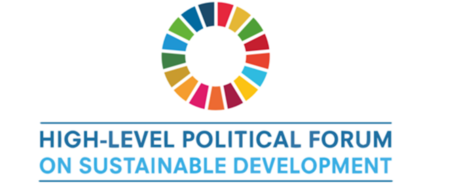Our Terms & Conditions | Our Privacy Policy
High-level Political Forum on Sustainable Development (HLPF) 2025
The High-level Political Forum on Sustainable Development (HLPF) 2025 concluded today after critical discussions spanning from 14 to 23 July 2025 in New York. The forum brought together world leaders, ministers, policymakers, and stakeholders to assess progress on the Sustainable Development Goals (SDGs) and chart a roadmap towards the 2030 Agenda. The forum is convened under the aegis of the Economic and Social Council (ECOSOC). This year, the theme was “Advancing sustainable, inclusive, science- and evidence-based solutions for the 2030 Agenda for Sustainable Development and its Sustainable Development Goals for leaving no one behind.”
In his opening remarks, Lok Bahadur Thapa, Vice-President of ECOSOC, noted the insufficient progress across the Goals, with stagnation and regression on some SDG targets. It was reported that 35% of SDG targets are making moderate progress, while progress on 47% is insufficient and 18% are regressing. Amina Mohammed, UN Deputy Secretary-General, linked geopolitical conflicts, financing gaps, inequalities, and climate change to the slow progress of the SDGs.
In-Depth SDG Reviews
HLPF 2025 conducted comprehensive reviews of five critical SDGs, each representing key pillars of global development:
On SDG 3 (Health and Well-Being), Chair Lok Bahadur Thapa noted that none of the SDG 3 health targets are on track, with challenges such as climate change, urbanisation, and conflict compounding health inequalities. Panellists urged universal health coverage, gender-inclusive health systems, and the integration of climate and migration into health planning. Stakeholders from civil society emphasised accountability and rights-based cross-sectoral approaches, especially for marginalised groups.
Marking 30 years since the Beijing Declaration, the Forum highlighted persistent gaps in gender justice, particularly regarding SDG 5 (Gender Justice). UN Women’s Sima Bahous called for gender-responsive budgets, investment in care systems, and protection against digital hate speech and gender-based violence. Youth leaders and feminist organisations demanded structural reforms and inclusive policymaking. The LGBTQI stakeholder group, along with others, reminded participants that human rights must be recognised and protected for all genders.
SDG 8 (Decent Work and Economic Growth) was described as one of the most “off-track” goals. The discussions highlighted the need to formalise informal employment, address heat stress and labour rights, and promote inclusive digital transitions, green jobs, and youth employment. Delegates proposed a new social contract for decent work, linking SDG 8 to climate and social justice.
Ocean protection emerged as a priority in SDG 14 (Life Below Water). The discussant emphasised the expansion of marine protected areas, a ban on single-use plastics and bottom trawling, and the empowerment of small-scale fishers and Indigenous communities. Most importantly, they called for the ratification of the Biological Diversity of Areas Beyond National Jurisdiction (BBNJ) Agreement and the World Trade Organisation (WTO) Fisheries Subsidies Agreement. Women’s groups advocated for feminist ecological governance, while youth demanded a 60% ocean protection target.
On SDG 17 (Partnership and Multilateralism), the Forum emphasised inclusive multilateralism, with civil society, youth, and Indigenous Peoples calling for transparent financing, recognition of community-led data, and the protection of civic space and human rights.
UN leaders highlighted the role of Voluntary National Reviews (VNRs) as tools for accountability and peer learning.
Voluntary National Reviews (VNRs)
Describing VNRs as a template for peer learning, UN Secretary-General António Guterres lauded countries for producing more than 400 VNRs to date, noting that more than 150 countries have completed at least two SDG reviews.
Thirty-seven countries presented VNRs. Finland pointed to the value of science-based metrics to measure global impact and encouraged youth involvement in policy processes. The Philippines considered inclusive national planning in the development of a gender-responsive budgeting approach. Guatemala focused on addressing regional inequalities and recognising the rights of indigenous peoples as a fundamental path to sustainable development. Sudan, which is in the early stages of post-conflict recovery, discussed approaches to rebuilding public service provision and re-establishing community trust. Malaysia shared its digital governance model and documented 29 Voluntary Local Reviews (VLRs), demonstrating a high level of national-local SDG alignment.
Ministerial Segment and High-Level Participation
The ministerial segment of the HLPF 2025, which took place from July 21-23, highlighted important actions taken by global leaders. UN Secretary-General António Guterres characterised recent successes—including the Ocean Conference and Fourth International Conference on Financing for Development (FfD4)—as evidence of the potential success of multilateralism and called for urgent reforms in financing. UNGA President Philémon Yang characterised the Forum as a platform for executing transformative global agreements, such as the Sevilla Commitment.
Other ministers shared a similar sense of urgency, particularly from Canada, Finland, Indonesia, Portugal, and Kenya. Finland cautioned that failing to meet SDGs can threaten peace and trust, while Indonesia suggested scaling up the blue economy and empowering microenterprises in the digital realm.
Key Outcomes and Way Forward
The forum concluded with the adoption of a negotiated ministerial declaration that outlines global commitments and priorities for advancing sustainable development. This declaration is expected to provide practical guidance for accelerating SDG implementation in the remaining five years leading up to 2030.
The ECOSOC President will prepare a summary of the key policy messages arising from the Forum deliberations, which will synthesise recommendations from technical sessions, panel presentations, and country presentations. The Forum outcomes will inform the next UN sustainable development initiatives and serve as a framework for increased international cooperation.
Images are for reference only.Images and contents gathered automatic from google or 3rd party sources.All rights on the images and contents are with their legal original owners.



Comments are closed.